 Petzlover
Petzlover Rough Collie is originated from United Kingdom but Tea Cup Chihuahua is originated from Mexico. Rough Collie may grow 23 cm / 10 inches higher than Tea Cup Chihuahua. Rough Collie may weigh 27 kg / 60 pounds more than Tea Cup Chihuahua. Both Rough Collie and Tea Cup Chihuahua has almost same life span. Rough Collie may have more litter size than Tea Cup Chihuahua. Both Rough Collie and Tea Cup Chihuahua requires Moderate Maintenance.
Rough Collie is originated from United Kingdom but Tea Cup Chihuahua is originated from Mexico. Rough Collie may grow 23 cm / 10 inches higher than Tea Cup Chihuahua. Rough Collie may weigh 27 kg / 60 pounds more than Tea Cup Chihuahua. Both Rough Collie and Tea Cup Chihuahua has almost same life span. Rough Collie may have more litter size than Tea Cup Chihuahua. Both Rough Collie and Tea Cup Chihuahua requires Moderate Maintenance.
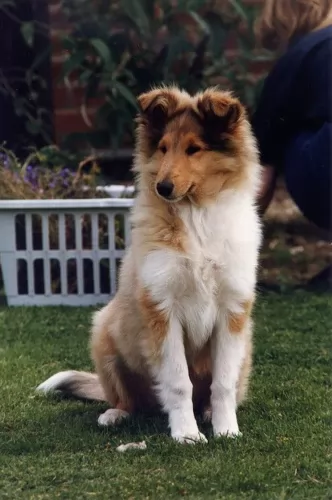 Many people have seen the movie ‘Lassie’, and of course this movie made the Collie popular and famous.
Many people have seen the movie ‘Lassie’, and of course this movie made the Collie popular and famous.
Apart from the Rough Collie, you also get the Smooth Collie. The Rough Collie’s origins start in the 1800’s in Scotland and Wales but unfortunately, the Rough Collie's exact origins are shrouded in lack of information.
These dogs were used as herding dogs in real-life and in movies, and it was in 1879 that the first English Rough Collie was imported to the USA, but it is the UK from whence the dog comes.
 Chihuahua is a state in the country of Mexico. From this state, the dog breed Chihuahua and the “teacup, or toy” chihuahua take their name. Interestingly the Chihuahua Club of America maintains that “teacup” Chihuahuas do not exist and that the size differential is normal for the breed. Chihuahuas or their ancestors have been around a very long time, sadly the exact origins of the Chihuahua are lost into the pages of history, but archaeological clues such as wheeled dog toys, art, and pottery link the Chihuahua to Mexico and to the Techichi dog. The Techichi dog at the time of the Spanish Conquistadors was sold for food (not unlike we sell beef or chicken) and also as a companion dog to death. Cortez even mentioned the Techichi dog in a letter sent back to Spain, describing them as being raised for food and sold in the marketplace.
Chihuahua is a state in the country of Mexico. From this state, the dog breed Chihuahua and the “teacup, or toy” chihuahua take their name. Interestingly the Chihuahua Club of America maintains that “teacup” Chihuahuas do not exist and that the size differential is normal for the breed. Chihuahuas or their ancestors have been around a very long time, sadly the exact origins of the Chihuahua are lost into the pages of history, but archaeological clues such as wheeled dog toys, art, and pottery link the Chihuahua to Mexico and to the Techichi dog. The Techichi dog at the time of the Spanish Conquistadors was sold for food (not unlike we sell beef or chicken) and also as a companion dog to death. Cortez even mentioned the Techichi dog in a letter sent back to Spain, describing them as being raised for food and sold in the marketplace.
When a death occurred a dog was chosen as a companion and cremated with the deceased. It was believed that the dog helped the soul of the decedent reach their eternal destination. The Techichi dog from which the modern-day chihuahua likely descended was very plentiful in the central American area that is now the country of Mexico and raised by the ancient Toltecs and later the Aztec people.
Chihuahuas are little dogs and come in a variety of coats, head shapes and even (within the designation small) sizes. The designation “teacup, toy or pocket” while not an official breed name is a useful descriptor, since they are the littlest of an already small breed and these minute pets, as puppies, may fit into a teacup or a pocket.
Fortunately while no longer a food source, the chihuahua is now sought after as a loyal and lively pet and companion.
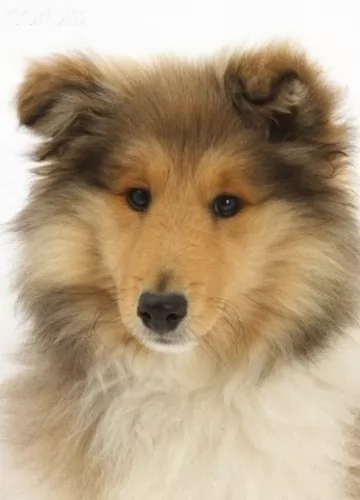 The Rough Collie or Long-haired Collie is considered to be a medium to large sized dog with a long, double-layer coat.You’ll find the coat mainly as tri-colored – white, fawn and dark brown and black.
The Rough Collie or Long-haired Collie is considered to be a medium to large sized dog with a long, double-layer coat.You’ll find the coat mainly as tri-colored – white, fawn and dark brown and black.
The Rough Collie stands at between 51 to 61cm in height and weighs between 18 and 30kg. The long, thin muzzled dog has semi erect, semi-floppy ears, sweet, gentle eyes and a long, plumed tail.
Rough collies are loving, gentle dogs who thrive on spending time with their human families. Their kindly nature makes them good therapy dogs.They don’t do well when left in the back yard on their own day after day. They’re social dogs who love playing with the children in the home and they get on well with other family pets.
The Rough Collie is highly intelligent and he is easy to train. With training and socialization he becomes so well behaved you can take him anywhere.
 Chihuahuas are small. Even the bigger ones are only about six pounds and a “teacup” or “toy” is often three pounds or less. Their bodies are slightly longer than they are tall, but even the tallest are not over nine inches. Chihuahua standing under five inches in height is not uncommon in the “teacup” or smallest of these dogs. They have two different head types and a domed skull. One type of head shape is like a deer while the other is described as an apple-shaped head. The apple-shaped heads are more popular than the deer shaped heads, although sometimes in the “teacup” especially the soft spot fails to close at maturity when growth is complete and the bones should knit, therefore leaving a soft spot in their skull – this is called a molera.
Chihuahuas are small. Even the bigger ones are only about six pounds and a “teacup” or “toy” is often three pounds or less. Their bodies are slightly longer than they are tall, but even the tallest are not over nine inches. Chihuahua standing under five inches in height is not uncommon in the “teacup” or smallest of these dogs. They have two different head types and a domed skull. One type of head shape is like a deer while the other is described as an apple-shaped head. The apple-shaped heads are more popular than the deer shaped heads, although sometimes in the “teacup” especially the soft spot fails to close at maturity when growth is complete and the bones should knit, therefore leaving a soft spot in their skull – this is called a molera.
Like different shaped heads chihuahua may have long hair or short-haired coats. The short-haired coats are smooth. The Chihuahua coats may be a large variety of colors ranging from black to white, with red, brown, fawn, cream and chocolate and they may be solid-colored, spotted or sabled. Personal preference is the determining factor on the type of coat a pet Chihuahua has since the breed does not have a preferred color, pattern, hair length or feel. Their muzzle (nose/mouth combination) is short and pointed. Chihuahua have have naturally erect pointed ears and large round eyes. A Chihuahuas tail is relatively long and mostly either curled up and over the back or carried up.
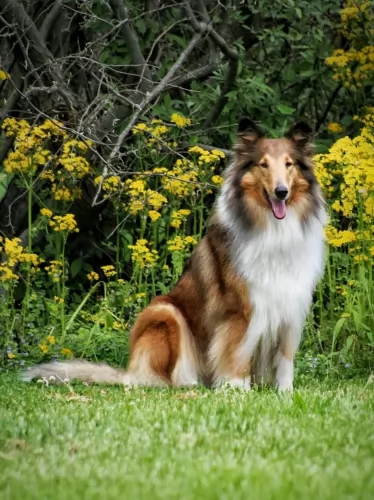 The Rough Collie is such an intelligent dog, but he is loving and devoted too. He can slot into life in the city or countryside because all he really wants is to be close to his human family.
The Rough Collie is such an intelligent dog, but he is loving and devoted too. He can slot into life in the city or countryside because all he really wants is to be close to his human family.
Wherever you live with your Rough Collie though, he will need to be well exercised. He is sweet but slightly timid and will want to be with a family that isn't too noisy in terms of lots of shouting.
People who have had Collies say these dogs make he most awesome pets, and in the right environment these wonderful intelligent dogs will make splendidly loyal, loving pets and companions,
 Children friendliness very interactive with family but has been known to nip at small children and bark, so no not really
Children friendliness very interactive with family but has been known to nip at small children and bark, so no not really
3. Adaptability yes but they are better off in apartments and homes not out in the country where their size makes them targets for predators.
4. Learning ability average ability to learn but Chihuahua can be but stubborn which may impact ability and willingness to learn.
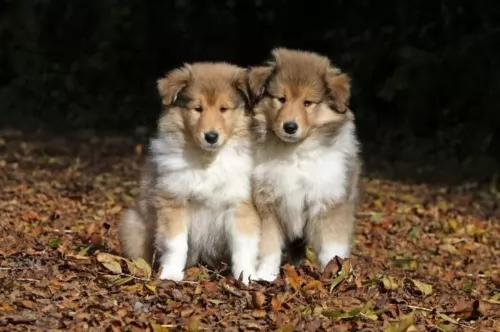 The Rough Collie can reach 12 to 14 years of age with good care. There are always some health issues to be aware of such as hereditary eye diseases. Also, as with most larger breeds, hip dysplasia is always a concern.
The Rough Collie can reach 12 to 14 years of age with good care. There are always some health issues to be aware of such as hereditary eye diseases. Also, as with most larger breeds, hip dysplasia is always a concern.
Other illnesses to look out for include cancer, skin allergies, bloat and Grey Collie Syndrome. As a responsible dog owner, get your pet to the doctor when you notice a change in his behavior – tiredness, vomiting, lethargy, unusual lumps, swelling and a feeling of depression.
This is a form of canine cyclic neutropenia which affects the Collie breed. There is a low concentration of neutrophils in the blood. It can be hereditary or it can develop because of a side effect of chemotherapy for instance. It is essentially caused by a defect in the bone marrow stem cells. Affected dog will always battle with gastrointestinal problems and infections of the eye.The life expectancy of a Collie with this ailment will be less than 3 years.
 Chihuahuas live on average fourteen to eighteen years. There are some issues that may cause concern or lower life expectancy.]
Chihuahuas live on average fourteen to eighteen years. There are some issues that may cause concern or lower life expectancy.]
• Hypoglycemia (low blood sugar) is something to watch for. Low blood sugar can cause death in just a few hours but when caught is very easily treated. Some of the symptoms are being uncoordinated when walking, acting sleepy or lethargic, unfocused sight, fainting, having a seizure or having spasms in the muscles of the neck. First aid can right this condition with a sweet supplement like corn syrup, or honey. This is more common in puppies, but the teacup chihuahuas are susceptible.
• Hydrocephalus (water on the brain) can affect many toy dog breeds. The puppy or dog will appear to have an oversized head, and be slow (display lethargy) and grow slower than its littermates.
• Pulmonic stenosis (a heart condition) occurs when the right ventricle is impeded. Teacup Chihuahuas are also susceptible to heart murmurs.
• Collapsed trachea this occurs when the cartilaginous rings in a Chihuahua do not form completely or weaken. This can be hereditary or an acquired condition and occurs in other small breeds of dog.
• Molera – where after finishing growth a soft spot remains in the skull and the bones do not knit. As a puppy, the owner must remain vigilant about head injuries.
• Obesity (overweight). Most of the time this is a result of the Teacup Chihuahua being overfed. Obesity can contribute to a shortened lifespan and chronic bronchitis.
• Cold susceptibility. Cold weather can cause Teacup Chihuahuas to shiver or tremble when exposed and during cold temperatures, the dogs may need to wear a sweater and boots outside and cuddle with their owners under blankets or bask in the sun to stay warm.
• Infected or injured eyes. Due to the prominent eyes, exposure to irritants such as dust, allergens, or dry air can cause the dog to develop this beginning with watering eyes.
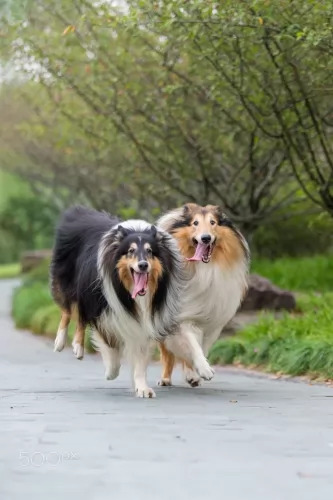 Your Rough Collie does shed so he will require a good brush twice a week. The long silky hair can matt so this grooming session will be important.
Your Rough Collie does shed so he will require a good brush twice a week. The long silky hair can matt so this grooming session will be important.
Your film-star collie is an active, athletic dog. He has always been used to herding sheep, and instinctively he wants to be active. His bright eyes are always alert to some action, and his exercise needs go beyond just allowing him to run around in your back yard.
He is the kind of dog that wants something more energetic such as going on hikes or long walks and running after sticks or balls on the beach.
A Collie is an energetic dog and will require the best dog food there is. If you give him commercially manufactured food make sure it is the right food for his size, his breed and his energy levels.
To add some variety, feed him some home-made food occasionally which can be added to his dry kibble twice a week. Boiled chicken, brown rice or pasta and spinach, sweet potatoes and carrots are a healthy choice for your pet. Try and feed him some raw meat occasionally. Ensure there is always a bowl of fresh, cool water for him.
 1. Feeding the Puppies. Puppies should be fed four times a day. Underfeeding can cause the issues of low blood sugar and overfeeding can result in obesity increasing the risk of other health complications.
1. Feeding the Puppies. Puppies should be fed four times a day. Underfeeding can cause the issues of low blood sugar and overfeeding can result in obesity increasing the risk of other health complications.
2. Feeding the Adult. Adult teacups are also vulnerable to hypoglycemia and obesity. Of course, the low blood sugar will be much more acute than obesity and need prompt care if it occurs. Adult teacups should be fed twice a day.
3. Points for Good Health. The chihuahua generally exhibits more vigor and endurance than pet owners expect from such a small breed of dog.
4. Games and Exercise for Teacup Chihuahua. Go ahead and run and play but remember even with the unexpected stamina and endurance this is a very small dog, small legs, using discernment, judgment, and restraint so the games and exercise is fun and builds health and is a special bonding time, without jeopardizing the sugar levels or causing exhaustion or misery.